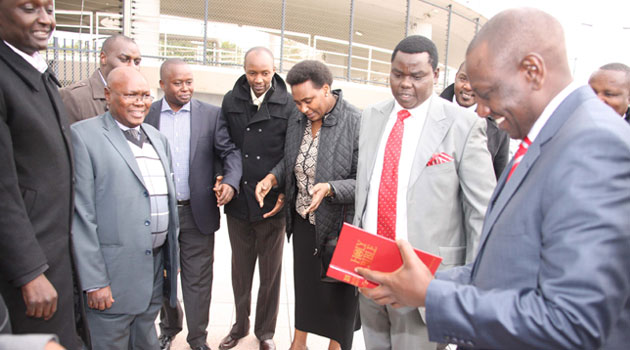
ICC Prosecutor Fatou Bensouda on the other hand has maintained that the two have a case to answer for the atrocities committed in the Rift Valley/FILE
The two through their legal defence teams have in a 95-page document argued that they are wrongly accused of committing crimes of murder, forcible transfer of populations and persecution in the Rift Valley during the 2007-8 Post Election Violence in Kenya.
They have claimed that prosecution witnesses were coached on how to fix Ruto and Sang and promised better lives abroad if they gave evidence to demonstrate their criminal responsibility.
ICC Prosecutor Fatou Bensouda on the other hand has maintained that the two have a case to answer for the atrocities committed in the Rift Valley.
She has alleged that Ruto financed activities of a network that was in charge of recruiting, organising and carrying out attacks in the Rift Valley. Sang is alleged to have used his radio show at Kass FM to incite Kalenjins to attack Kikuyus and also broadcast activities of the network.
Bensouda has also told ICC judges that her witnesses were interfered with by persons acting on behalf of the accused to weaken her case.
During the four days beginning Tuesday, the court will hear arguments made by the defence, the prosecution and victims legal representative Wilfred Nderitu regarding the motion that seeks to have the case terminated based on the prosecutor’s evidence.
The trial chamber will determine the motion of no-case-to-answer for every of the three charges each of the accused persons is facing.
Partial or full rejection of the motion will mean that Ruto and Sang have a case to answer and must be put on their defence.
But if the judges accept the motion for all the three charges, it will mark the end of the case meaning that the evidence presented by the prosecution is insufficient to establish the criminal responsibility of the two in the atrocities committed during the 2007 PEV.
READ: Will Ruto, Sang bid to end ICC case in March succeed?
The Appeals Chamber is however also expected to make a landmark ruling which will determine if the prosecution will secure or lose significant evidence that Bensouda has argued without it, her case would be weak.
It is evidence that covers prior recorded statements of five witnesses who recanted their evidence at the trial stage.
Bensouda had requested the Appeals Chamber to issue a ruling on use of rule 68 before a decision on the no-case-to-answer motion was made.
READ: Kenya files protest to ASP over rule affecting Ruto case
Trial Chamber V (a) allowed the prosecution to use their primary evidence but the defence has challenged the decision arguing that application of rule 68 as adopted by the 2013 Assembly of States Parties (ASP) was not to be employed retrospectively.









































